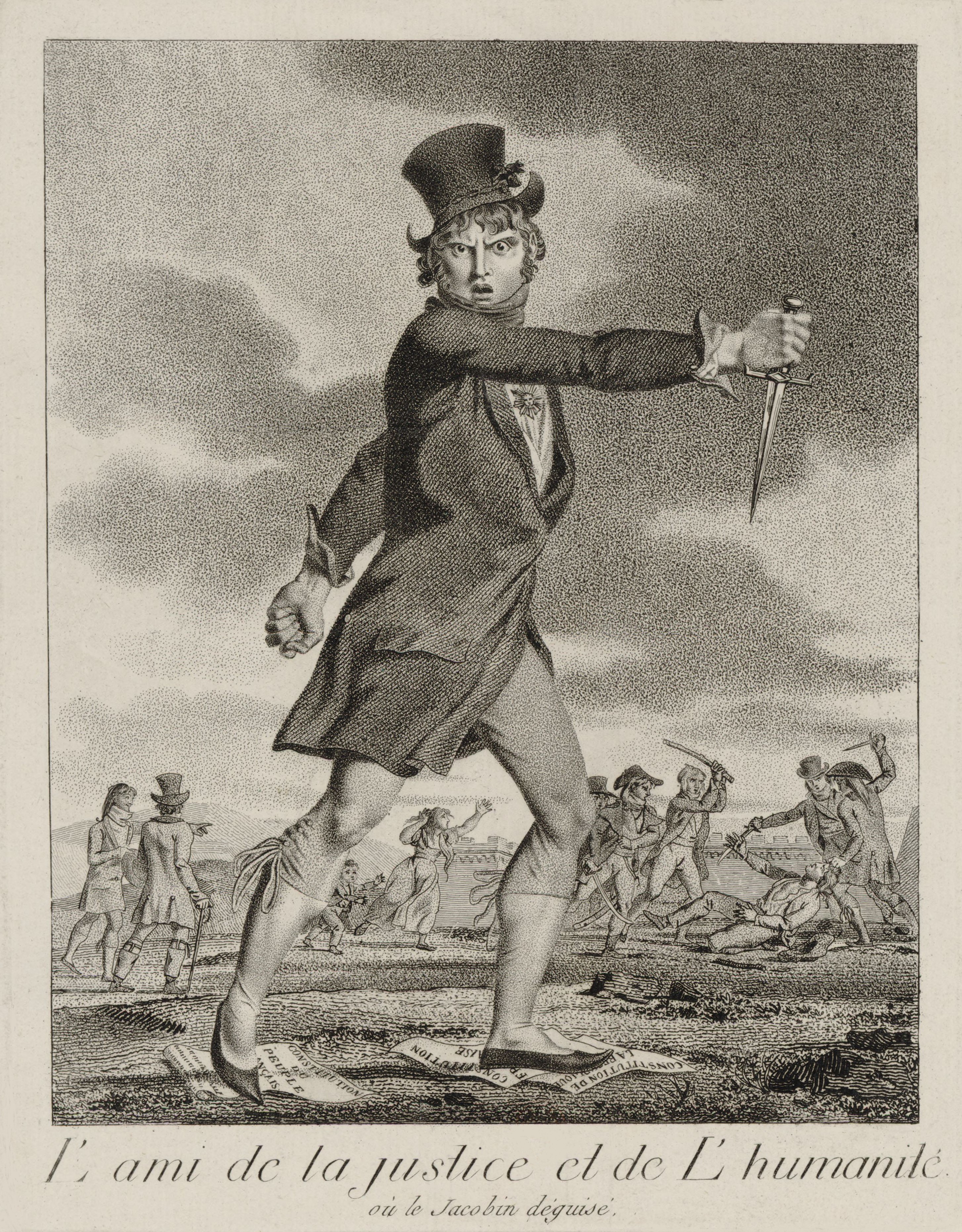|
First White Terror
The White Terror (french: Terreur Blanche) was a period during the French Revolution in 1795 when a wave of violent attacks swept across much of France. The victims of this violence were people identified as being associated with the Reign of Terror – followers of Robespierre and Marat, and members of local Jacobin clubs. The violence was perpetrated primarily by those whose relatives or associates had been victims of the Great Terror, or whose lives and livelihoods had been threatened by the government and its supporters before the Thermidorean Reaction. Principally, these were, in Paris, the Muscadins, and in the countryside, monarchists, supporters of the Girondins, those who opposed the Civil Constitution of the Clergy and those otherwise hostile to the Jacobin political agenda. The Great Terror had been largely an organised political programme, based on laws such as the Law of 22 Prairial, and enacted through official institutions such as the Revolutionary Tribunal, but ... [...More Info...] [...Related Items...] OR: [Wikipedia] [Google] [Baidu] |
Terreur Blanche 1795
The Reign of Terror (french: link=no, la Terreur) was a period of the French Revolution when, following the creation of the First Republic, a series of massacres and numerous public executions took place in response to revolutionary fervour, anticlerical sentiment, and accusations of treason by the Committee of Public Safety. There is disagreement among historians over when exactly "the Terror" began. Some consider it to have begun only in 1793, giving the date as either 5 September, June or March, when the Revolutionary Tribunal came into existence. Others, however, cite the earlier time of the September Massacres in 1792, or even July 1789, when the first killing of the revolution occurred. The term "Terror" being used to describe the period was introduced by the Thermidorian Reaction who took power after the fall of Maximilien Robespierre in July 1794, to discredit Robespierre and justify their actions. Today there is consensus amongst historians that the exceptional revol ... [...More Info...] [...Related Items...] OR: [Wikipedia] [Google] [Baidu] |
Sans-culotte
The (, 'without breeches') were the common people of the lower classes in late 18th-century France, a great many of whom became radical and militant partisans of the French Revolution in response to their poor quality of life under the . The word , which is opposed to "aristocrat", seems to have been used for the first time on 28 February 1791 by Jean-Bernard Gauthier de Murnan in a derogatory sense, speaking about a " army". The word came into vogue during the demonstration of 20 June 1792. The name refers to their clothing, and through that to their lower-class status: were the fashionable silk knee-breeches of the 18th-century nobility and bourgeoisie, and the working class wore ''pantaloons'', or long trousers, instead.Chisholm, Hugh (1911). "Sans-culottes". ''Encyclopædia Britannica'' (11th ed.), 1911. This saying meant "ordinary patriots without fine clothes", and referred to the fancy clothes that famous patriots wore. They wore pants with cuffed, rolled up bottoms ... [...More Info...] [...Related Items...] OR: [Wikipedia] [Google] [Baidu] |
Marc-Guillaume Alexis Vadier
Marc-Guillaume Alexis Vadier (17 July 1736 – 14 December 1828) was a major French politician of the French Revolution. He is sometimes called the "Great Inquisitor", for his active participation in the Reign of Terror. During this time, he was in charge of the Comité de Sûreté Générale, which was tasked with the prosecution of the so-called enemies of the Revolution. He is probably one of the main actors in the fall of Robespierre, which was his political rival. Early career Son of a wealthy family in Pamiers, Ariège, he served in the army of the king Louis XV, taking part in the Seven Years' War and the Battle of Rossbach on 5 November 1757. Upon his return to France in 1758, Vadier acquired large tracts of land in Pamiers and in 1770 purchased the office of ''conseiller'' (magistrate), which brought him into conflict with many of the local aristocracy and affluent bourgeoisie. Elected as deputy to the Estates of the realm, Third Estate in the Estates-General of 1789, Es ... [...More Info...] [...Related Items...] OR: [Wikipedia] [Google] [Baidu] |


